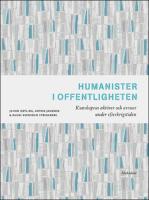Humanister i offentligheten
Kunskapens aktörer och arenor under efterkrigstiden
Author(s)
Östling, Johan
Jansson, Anton
Svensson Stringberg, Ragni
Language
SwedishAbstract
There is a strong narrative on how the humanities were marginalized in postwar Sweden: in the land of engineers, technocrats and social scientists, there was no room for erudition, philosophy and history. This book challenges such a notion and shows how clearly the humanities were present in the public sphere of the time. By applying perspectives from the history of knowledge, the authors illustrate how humanists were key figures in the welfare society’s culture and politics, media and book market, education and intellectual debate.
At the heart of the book is the public sphere of the 1960s and 1970s. In a first part, the authors highlight how humanists played a decisive role in the young television’s educational program as well as in the popular science paperback publishing of the time and on the essay pages in the newspapers. In a second part, attention is drawn to the humanities’ place in the Christian cultural sphere, the labour movement’s education work and the New Left’s book cafés. We meet people like Per I. Gedin, Gunnel Vallquist and Jan-Öjvind Swahn, but also TV producers, study circle organizers, translators of radical non-fiction and many others. They all helped to set humanistic knowledge in motion during the postwar decades.
Against an international background, the image of a humanistic knowledge system with deep roots and wide connections in Swedish society emerges. It is about these actors and arenas of knowledge that this book is about.


 Download
Download Web Shop
Web Shop